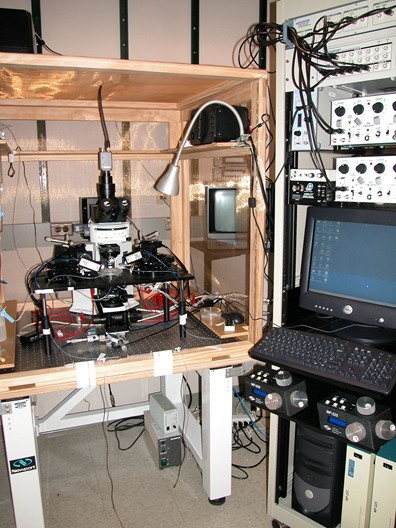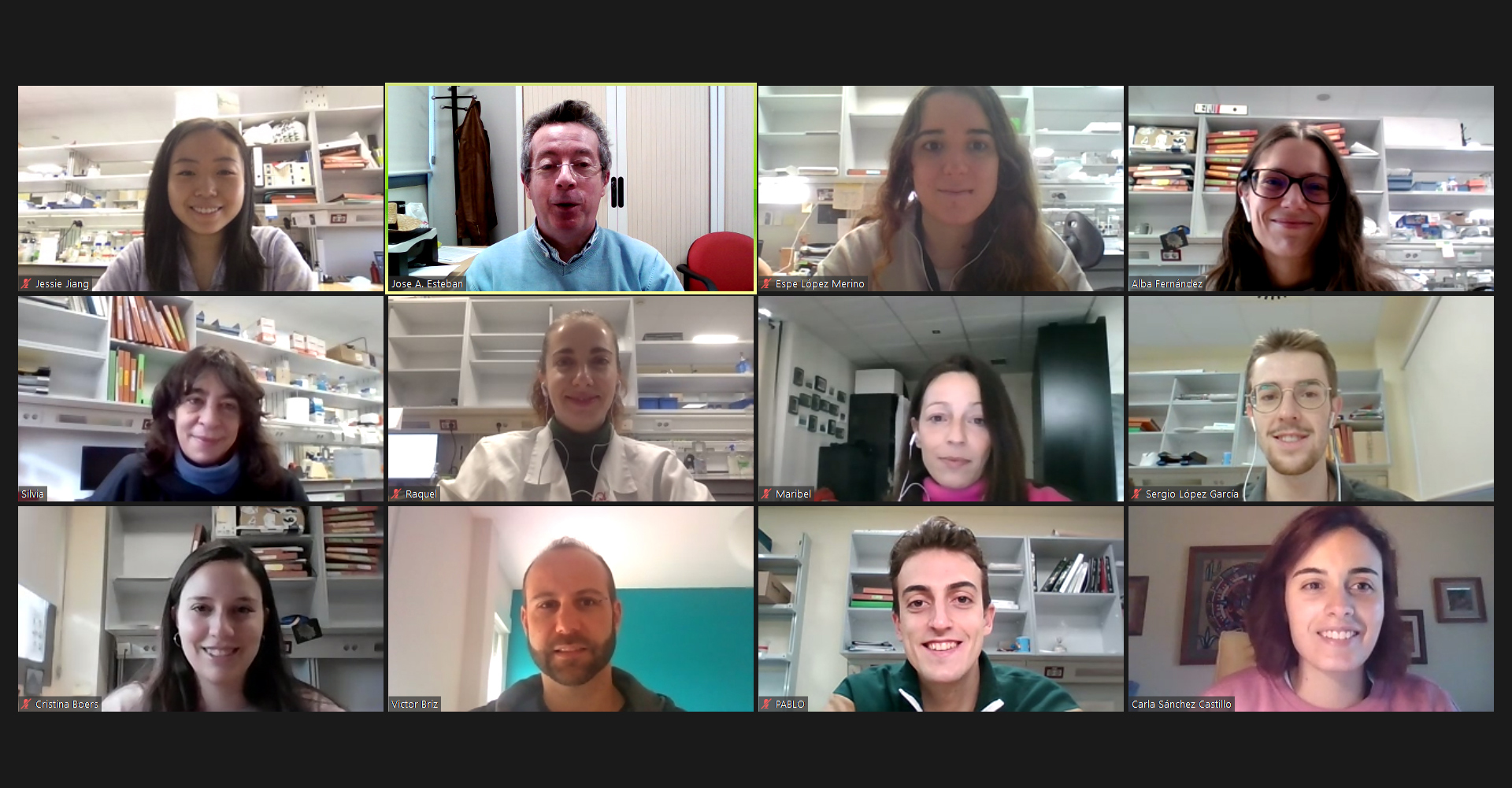Mechanisms of synaptic plasticity, and contribution to cognitive function
Research summary:
Synaptic connections in the brain are continuously remodeled in response to neuronal activity. This process, known as synaptic plasticity, is widely accepted as the cellular basis for learning and memory, and it is also critical for the establishment of functional neuronal circuits during development. Additionally, several neurological and neurodegenerative diseases (such as schizophrenia, mental retardation and Alzheimer's disease) have been correlated with deficits in synaptic plasticity. Research in the laboratory is focused on the cellular and molecular processes responsible for synaptic plasticity, as a way to understand basic mechanisms underlying brain development, learning and memory.
Recent investigations have demonstrated that synaptic delivery of neurotransmitter receptors belonging to the AMPA class of glutamate receptors is a crucial element for development and synaptic plasticity in the hippocampus. The research work in the lab concentrates on the mechanisms that regulate the trafficking and synaptic delivery of AMPA receptors. Three specific projects are being addressed:
1) Identification of the signal transduction pathways that mediate receptor trafficking and synaptic delivery.
2) Identification of the cellular machinery that controls the movement and targeting of the receptors.
3) Analysis of potential alterations in synaptic plasticity mechanisms associated to cognitive disorders.
A major experimental approach in the laboratory is the expression of recombinant receptors and regulatory proteins tagged with GFP in hippocampal slices, using electrophysiology and neuronal imaging as functional assays. The laboratory has a strong multidisciplinary scope, which we believe is essential for the general goal of understanding how individual molecules contribute to neuronal function.

Figure 1.

Figure 2.

Figure 3.

| Last name | Name | Laboratory | Ext.* | Professional category | |
|---|---|---|---|---|---|
| Esteban García | José Antonio | 303 | 4637 | jaesteban(at)cbm.csic.es | E. Profesores de Investigación de Organismos Públicos de Investigación |
| Fernández Rodrigo | Alba | 303 | 4657 | alba.fernandez(at)cbm.csic.es | M2 66,66% |
| García Vilela | Celia | 303 | 4657 | celia.garcia(at)cbm.csic.es | Titulado Sup. Actividades Tecn. y Prof.GP1 |
| Gutiérrez Eisman | Silvia | 303 | 4657 | sgeisman(at)cbm.csic.es | E.Ayudantes De Invest. De Los Oo.Publicos De Investigacion |
| López Merino | Esperanza Isabel | 303 | 4657 | elopez(at)cbm.csic.es | M2 66,66% |
| Maroto Martínez | Irene Berenice | 303 | 4637 | imaroto(at)cbm.csic.es | Doctor FC3 |
Relevant publications:
- Brachet A, Lario A, Fernández-Rodrigo A, Heisler FF, Gutiérrez Y, Lobo C, Kneussel M, Esteban JA. A kinesin 1-protrudin complex mediates AMPA receptor synaptic removal during long-term depression. Cell Rep 36:109499, 2021.
- Gutiérrez Y, López-García S, Lario A, Gutiérrez-Eisman S, Delevoye C, Esteban JA. KIF13A drives AMPA receptor synaptic delivery for long-term potentiation via endosomal remodeling. J Cell Biol 220:e202003183, 2021.
- Draffin JE, Sánchez-Castillo C, Fernández-Rodrigo A, Sánchez-Sáez X, Ávila J, Wagner FF, Esteban JA. GSK3α, not GSK3β, drives hippocampal NMDAR-dependent LTD via tau-mediated spine anchoring. EMBO J 40:e105513, 2021.
-
Navarrete M, Cuartero MI, Palenzuela R, Draffin JE, Konomi A, Serra I, Colié S, Castaño-Castaño S, Hasan MT, Nebreda AR, Esteban JA. Astrocytic p38α MAPK drives NMDA receptor-dependent long-term depression and modulates long-term memory. Nat Commun 10(1):2968, 2019.


- Sánchez-Puelles C, Calleja-Felipe M, Ouro A, Bougamra G, Arroyo A, Díez I, Erramuzpe A, Cortés J, Martínez-Hernández J, Luján R, Navarrete M, Venero C, Chan A, Morales M, Esteban JA*, Knafo S*. PTEN activity defines an axis for plasticity at cortico-amygdala synapses and influences social behavior. Cereb Cortex, doi: 10.1093/cercor/bhz103, 2019.
- Palenzulea R, Gutiérrez Y, Draffin J, Lario A, Benoist M, Esteban JA. MAP1B light chain modulates synaptic transmission via AMPA receptor intracellular trapping. J Neurosci 37, 9945-9963, 2017.
- Knafo S, Esteban JA. PTEN: local and global modulation of neuronal function in health and disease. Trends Neurosci 40, 22-30, 2017.
- Knafo S, Sánchez-Puelles C, Palomer E, Delgado I, Draffin JE, Mingo J, Wahle T, Kaleka K, Mou L, Pereda-Perez I, Klosi E, Faber EB, Champan HM, Lozano-Montes L, Ortega-Molina A, Ordóñez-Gutiérrez L, Wandosell F, Viña J, Dotti CG, Hall RA, Pulido R, Gerges NZ, Chan AM, Spaller MR, Serrano M, Venero C, Esteban JA. PTEN recruitment controls synaptic and cognitive function in Alzheimer's models. Nat Neurosci 19, 443-453, 2016.
Science Signaling ¦ EDITORS' CHOICE - Brachet A, Norwood S, Brouwers JF, Palomer E, Helms JB, Dotti CG, Esteban JA. LTP-triggered cholesterol redistribution activates Cdc42 and drives AMPA receptor synaptic delivery. J Cell Biol 208, 791-806, 2015.
- Benoist M, Palenzuela R, Rozas C, Rojas P, Tortosa E, Morales B, González-Billault C, Avila J, Esteban JA. MAP1B-dependent Rac activation is required for AMPA receptor endocytosis during long-term depression. EMBOJ 32:2287-2299, 2013.
- Fernández-Monreal M, Brown TC, Royo M, Esteban JA. The balance between receptor recycling and trafficking toward lysosomes determines synaptic strength during long-term depression. J Neurosci 32:13200-13205, 2012.
- Knafo S, Venero C, Sánchez-Puelles C, Pereda-Peréz I, Franco A, Sandi C, Suárez LM, Solís JM, Alonso-Nanclares L, Martín ED, Merino-Serrais P, Borcel E, Li S, Chen Y, Gonzalez-Soriano J, Berezin V, Bock E, DeFelipe J, Esteban JA. Facilitation of AMPA receptor synaptic delivery as a molecular mechanism for cognitive enhancement. PLoS Biology 10, doi:10.1371/journal.pbio.1001262, 2012.
NATURE | RESEARCH HIGHLIGHTS
- Jurado S, Benoist M, Lario A, Knafo S, Petrok CN and Esteban JA. PTEN is recruited to the postsynaptic terminal for NMDA receptor-dependent long-term depression. EMBOJ 29:2827-2840, 2010.
- Arendt KL, Royo M, Férnandez-Monreal M, Knafo S, Petrok CN, Martens JR and Esteban JA. PIP3 controls synaptic function by maintaining AMPA receptor clustering at the postsynaptic membrane. Nat Neurosci 13:36-44, 2010.





















